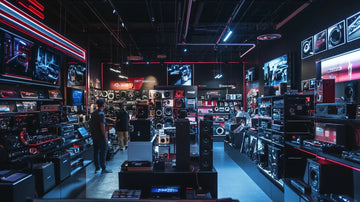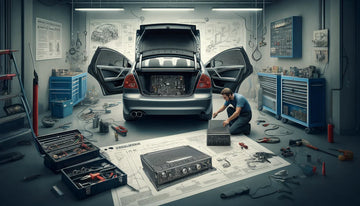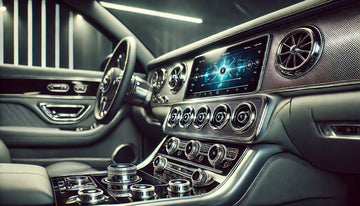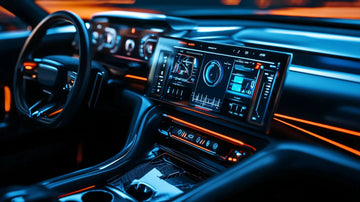Key Highlights
- Making your car's sound system better can really improve how music sounds when you're driving, making it a lot more fun.
- Before you start upgrading, it's important to understand the basics of car audio. This includes understanding all the different components and how they work together.
- It helps to know when it might be time for an upgrade. Maybe you're not happy with how things currently sound, or everything feels a bit outdated.
- When thinking about boosting your car audio, consider what you can afford, choose the right parts that meet your needs, and plan out their installation.
- Following an easy-to-understand guide on updating each part of your vehicle's audio setup ensures a smooth process from start to finish.
- Improving car audio systems has lots of benefits like enhanced sound quality, louder volume without any fuzziness, and overall making every driveway more enjoyable.
Introduction
Starting to improve the sound components in your car can really make driving a lot more enjoyable. Before you dive into making any changes, it's important to get a good grasp of how car speakers and complex sound systems work. Knowing when it's time for an upgrade is key to getting better audio in your vehicle.
Understanding Car Audio Basics

In car audio, everything revolves around how various components mesh together. From the head unit to the speakers in your car, each part plays a crucial role in delivering top-notch sound quality while you enjoy music or any other audio inside your vehicle. By getting familiar with these elements, such as understanding amplifiers boost volume and subwoofers emphasize low bass tones, you can figure out which upgrades will make your car's sound system better. Switching out the original factory head unit for one from an aftermarket brand is a big step towards improving both the sound quality and performance of your vehicle's audio setup.
The Components of a Car Audio System
In a car audio system, you've got key parts like the stereo, speakers, amps, and subwoofers. At the center of it all is the head unit which lets you play music and connect your phone to your car. When we talk about how good your car sounds, speaker systems are really important; there's stuff like coaxial and component speakers to pick from. Amps help make your tunes louder and clearer by boosting up the sound signals. And for those awesome deep bass vibes that make your music feel full-bodied in your ride? That's where subwoofers come into play. subwoofers Getting to know these pieces better can seriously upgrade your cars sound game from just okay to extraordinary.
How Does Car Audio Work?
Car audio systems work by converting electrical signals into sound waves that our ears can pick up, thanks to speakers. This process involves amplifying the signal before it reaches components like speakers and subwoofers. With a few adjustments here and there, you can really improve how your system sounds. Understanding this process is key for anyone interested in upgrading their car's audio system.
Recognizing the Need for an Upgrade

When you realize the sound in your car isn't as crisp as it used to be, with tunes sounding blurry or the system feeling outdated, that's a sign you might need an upgrade. With an update, sounds become sharper and bass gets richer; everything just works better together, enhancing your audio experience. Such improvements can turn even long drives into enjoyable adventures by making every song feel like part of a thrilling journey. Upgrading not only makes daily commutes more exciting but also revives your favorite tracks, adding joy to every trip. However, before diving into any upgrades, it's crucial to check if your current setup really needs tweaking. To figure this out: get inside your car and close all doors and windows; then start up the radio or connect your phone to play some music through the stereo system.
Signs Your Car Audio Needs an Upgrade
When the music in your car starts sounding fuzzy or if you can't hear the bass clearly, it might be time to think about getting a new audio system for your car. If picking out voices and instruments becomes hard, that's another sign something isn't right. Also, when noises from outside mess up what you're listening to and turning up the volume doesn’t fix it, then you definitely need an upgrade. Fixing these problems can make listening to music in your car a lot more enjoyable.
Benefits of Upgrading Your Car Audio System
Upgrading your car's sound system comes with a bunch of perks. It makes the music quality better, so you can really get into your tunes while on the road, making every trip more fun. With customization options, you can tweak things just how you like them, maybe adding more bass or going for those clear high notes. A top-notch audio setup not only makes driving nicer but also bumps up your car's value—handy if you're thinking about selling it later on. On top of that, by replacing the standard stereo with something better, annoying noises from bad sound quality become a thing of the past. When installing a new car stereo system in your vehicle, features like Auto EQ and time alignment are now within reach along with HD radio tuners and satellite radio, significantly improving the audio experience while driving.
Why wait to make these improvements? By upgrading your car's audio, you're guaranteed to increase both the enjoyment and safety of every drive!
Preparing for Your Car Audio Upgrade

Before diving into improving your car's sound system, ensure you have all the needed items. This includes tools like screwdrivers, wire cutters, and electrical tape. As for budgeting for this upgrade, it's important to be practical about how much you'll spend. Research the prices of components such as speakers and amplifiers so that your purchases are guided by a carefully planned budget and not just on-the-spot decisions.
Equipment and Tools You Will Need
To make sure your car audio system upgrade goes smoothly, it's important to have the right tools and gear from the start. Start off by getting things like panel removal tools, wire cutters, devices for crimping wires, a soldering tool, electrical tape, and something to measure electricity with.
On top of that, think about buying materials that soundproof your car for better sound quality and adapters for speakers along with wiring harnesses which help make setting everything up easier. Don't overlook grabbing connectors, screws, and cable ties too; they'll help you keep all parts neatly and securely in place.
Planning Your Budget for an Upgrade
When thinking about making your car's sound system better, it's smart to start by figuring out how much money you'll need. Look at the prices of essential parts like front speakers, amplifiers, and subwoofers. Also, remember to include any costs for tools or paying someone to install everything if you're not doing it yourself.
It helps a lot to check out the cost of top-notch audio gear before buying anything. Putting aside some cash for materials that make your car quieter inside can really improve how music sounds in there too. Planning your budget well is crucial when upgrading your sound system; this way, you get excellent quality without spending too much money—something that’s becoming more important as a lot of cars come with great built-in audio systems these days.
Upgrading Car Audio Components
The first thing you need to do is choose the right components for your system. You have to consider how new speakers, an amplifier, and a subwoofer will interact with each other. For step two, consider adding new speakers to enhance the sound quality. They should be compatible with your car's stereo system. In step three, by introducing an amplifier, you're boosting not just the loudness but also making everything sound clearer, improving your car's overall audio experience.
In the fourth step, we add a subwoofer to your setup. This provides the rich, deep bass sound that brings music to life in your vehicle. For the fifth step, our recommendation involves choosing materials designed to block out road noise. Doing this lets you appreciate clearer audio without being disturbed by external sounds.
Wrapping things up, step six is all about making the right adjustments to ensure your new audio system setup works at its best.
Step 1 involves picking the best parts for your setup.
When you're thinking about making your car stereo better, the first step is really important: choose the right components for what you want to do. Consider your car's needs based on how awesome you want the sound and whether everything will work well together. Determine if it's time to get a new head unit, set of speakers, amplifier, or subwoofer.
For those with older cars, it's super important to consider whether new parts will match your existing speaker setup. Sticking with what matches your current system is best to dodge any problems. If crystal-clear sound is what you’re after, component speakers might be worth looking into; however, coaxial speakers could be easier if that sounds too complicated or pricey for ya’.
Remember how much cash you can throw at this project and aim for audio quality that meets your budget and desires without going overboard. By carefully comparing different brands and models, make sure all pieces mesh well to deliver top-notch sound from your car stereo.
Step 2: New Speakers for Enhanced Sound
The next thing you'll want to do is put in some new speakers to make your car's sound system better. This step is really important if you're looking to get a clearer and richer sound than what the standard speakers can offer. Choosing the right speakers that work well with your car stereo can seriously improve how clear and deep the music sounds. With high-quality speakers, there's a big improvement over the original setup, making sure that music and other sounds are spread out evenly inside your car, which makes listening to anything way more engaging.
To make your car's sound system better, it's really important to think about how big the speakers are, how much power they can handle, and where you put them. On top of that, getting a new receiver for your car can make a huge difference in how good the music sounds. By replacing the old radio with a new one, you'll get more power and clearer sound from your speakers no matter how loud or soft you play your music. This simple change can greatly improve what you hear while driving around.
Step 3: Adding an Amplifier
Think about putting an amplifier in your car to make the music louder and clearer. This gadget makes the sound stronger, so your tunes come out more vibrant and crisp. When you add an amplifier to your car's stereo setup, it really steps up the quality of sound, especially if you've got some nice speakers to go with it.
For those who love their music and want the best listening experience in their ride, getting an amplifier is key—it takes things way beyond what a regular car audio system can do. With this tech, expect to dive into rich and top-notch sounds while on the move. Having a car amplifier plays a big role in boosting your journey's soundtrack by making signals stronger and songs clearer.
Depending on what you need and how much you're willing to spend, there are two main types of amplifiers for cars that can help improve your audio system.
Step 4: Integrating a Subwoofer for Deep Bass
Think about putting a subwoofer in your car to make the bass sound better. This particular kind of speaker, when set up right and given enough power, plays low sounds really well, making the bass feel deep and intense. When picking out a subwoofer, you should look at how big it is and what its power limits are.
Bigger ones usually give you deeper bass but take up more room. The power handling tells you how much electricity it can deal with while still sounding good. Make sure that the amount of power your amplifier can put out matches what the subwoofer needs for everything to work best.
The placement of your subwoofer is key, especially if you're aiming for the best sound quality in your car audio system or just want to boost what you currently have. Many folks discover that placing their subs in the trunk or cargo area enhances the bass throughout their vehicle. But, it's okay to experiment with various locations until you get that perfect sound vibe.
Step 5 involves adding materials that soak up sound to improve acoustics.
When you're driving, road noise can mess up the sound of your music. This noise comes from the tires and engine as your car moves along. It makes it harder to enjoy and hear your tunes.
Consider using acoustic foam or mass-loaded vinyl to make your ride quieter and reduce road noise. These materials are really good at absorbing irritating vibrations and sounds, so you can have a much more peaceful drive while jamming out to your favorite music.
To begin with, consider placing materials that block sound in areas such as your doors, the floorboard under your feet, and the trunk to reduce vibrations and stop road noise from entering. Pay extra attention to places where you hear a lot of noise—like around the wheel wells or close to the engine.
By putting in these materials, you not only cut down on annoying sounds from the outside but also improve how things sound from your speakers. This happens because it keeps those pesky buzzes out, making sure what you hear is much clearer.
Step 6: Tuning Your New Audio System
After you've upgraded your car audio components, tuning your new sound system properly is crucial for achieving the best sound quality. By adjusting different settings and equalizers, you can make sure the music sounds exactly to your liking.
Begin with tweaking the gain knobs on your amplifier. These knobs adjust how responsive the amp is to signals coming from your head unit, making sure it receives just the perfect amount of signal without distorting anything.
After that, start messing with the equalizer settings to tweak things more. With the equalizer, you can adjust sound frequencies to match what you like hearing. Keep trying various changes until it all sounds just right—bringing out the best in your car audio and improving any parts that aren't up to par yet.
Consider getting a digital sound processor (DSP) or an amp with built-in DSP to make your new audio system sound even better. A DSP handles the tricky job of adjusting where and when each note plays, making what you listen to feel more real. With the AmpPRO package, which has a module and a special T-harness for your vehicle, connecting speaker-level signals to your new amplifier is straightforward.
While the AmpPRO on its own doesn't offer much in terms of EQ or other adjustments, pairing it with a digital signal processor (DSP) can really take your sound quality to the next level.
Make sure to keep adjusting your tuning settings whenever you switch up the music, change what you're listening to, or if things just don't sound as good as before. By staying on top of this, you'll always have the best sound quality while driving around in your car.
Advanced Tips for Audiophiles
For music lovers who crave the finest sound quality in their vehicles, here are some excellent tips to enhance your car's audio system. It is crucial to start by selecting premium audio equipment. High-quality speakers, amplifiers, and digital sound processors can significantly elevate your tunes.
By tweaking the settings on equalizers and digital sound processors, you get to fine-tune your music exactly how you prefer it. This involves altering various components of the song to suit your taste perfectly. On top of that, opting for high-resolution audio files can significantly enhance your listening experience. These files offer much clearer and more captivating sounds compared to standard ones.
Tweaking sounds using equalizers and digital sound processors lets you personalize how your music feels. With these tools, adjusting different parts of the audio spectrum is easy, making sure everything from the bass to the treble fits just right for your ears. It's like having a magic wand that changes how songs sound, ensuring they match perfectly with what you love listening to.
To get the best sound in your car's audio system, consider tweaking it with equalizers and digital sound processors (DSPs). These gadgets allow you to fine-tune the tiny details in music, which really makes a big difference to how everything sounds.
Equalizers and digital sound processors allow you to personalize your car's audio and make every drive a more enjoyable experience. With these tools, you can adjust different parts of the audio spectrum, from bass to treble, to fit your personal preferences. Spending a lot of time in our cars, it's important to have the perfect sound system. Equalizers let you change the volume of different parts of a song, while digital sound processors allow you to line up the timing of each speaker and adjust the sound's location for a more realistic experience. Take the time to tweak these gadgets and find the perfect balance for your favorite tunes.
Upgrading to High-Resolution Audio Files
If you want to improve the sound of the music in your car, consider getting high-resolution audio files. With more detail and clarity than you're normally used to, these files can make it seem like you're right there with the music.
With high-resolution audio, songs are saved and recorded with better-quality settings. This keeps all the tiny sounds and parts of songs that usually disappear when a file is compressed. You'll need special equipment to play these superior-quality tunes in your car. It might be an advanced car stereo or sound system made for high-res audio, or an adapter (DAC) that connects your phone or laptop to your car's sound system.
Putting your money into top-notch tracks and the right gear can really make a difference in how good your audio experience is. There's a ton of great high-resolution music out there for you to dive into, and you'll quickly notice the big improvement it brings.
Troubleshooting Common Car Audio Issues
Even the best car audio systems can run into problems that mess with how your music sounds. It's really important to spot and fix issues like weird noises or disruptions quickly. These troubles might come from a bad ground connection, cables that aren't working right, or other gadgets close by causing electromagnetic interference.
Installing cables the right way, picking top-notch ones, and making sure everything is grounded properly can cut down on problems. Also, how you arrange the wires can affect how well your car's sound system works. If there isn't enough power or if connections aren't made correctly, it might mess up the sound or cause other issues with the system.
Checking these connections often can help stop troubles before they start. Getting help from experts in car audio systems is a good idea too; they know how to spot and fix usual issues efficiently.
Dealing with Interference and Noise
Listening to music in your car should be a blast, but sometimes noise and interference can ruin the vibe by messing with the sound quality. Luckily, there are several steps you can take to solve this problem.
Not having a good ground connection is usually a major issue. Ensure that all the spots where electricity returns to the earth are secure and free from rust. When grounding isn't done right, strange sounds can creep into your audio setup. Moreover, by placing wires away from areas with high electrical activity, you can prevent electromagnetic interference from disrupting your tunes.
Sometimes, you might run into issues because your cables are either damaged or not plugged in right. Take a good look at all your cables. If you find any that are worn out or not connected correctly, getting better ones that cut down on interference can really help. When this doesn't fix the problem, think about putting noise filters or suppressors between the main control of your car's audio system and the amplifier or between the amplifier and speakers. These gadgets do a great job at blocking out noise you don't want to hear, making sure only the sounds you do want come through loud and clear.
By directly dealing with these irritations, relaxing with top-notch sound quality while driving becomes much more fun as a part of an improved car audio experience. This boosts both the performance of the audio system and how much you enjoy it overall.
Solving Power and Wiring Problems
Problems with the electrical setup and cables can seriously mess up how your car's sound system works. If you're aiming for top-notch audio quality and want everything to operate without a hitch, it's crucial to get these issues sorted out.
A common problem is when the voltage drops. This occurs if your audio system isn't getting enough power, leading to it not performing optimally and possibly even distorting the sound. To address this, consider enhancing your power supply or opting for thicker cables to improve the flow of electricity.
For those using a factory radio that comes with a speaker detector, you might need a LOC (line output converter) equipped with an ohm resistance load switch. If you are experiencing issues with your car audio system, it is important to determine the main cause and decide on the best course of action. This may include upgrading your power supply, using thicker cables, or installing a LOC with an ohm-resistance load switch.
One issue is the lack of sufficient power. Without enough electricity flowing into your system, it might not function correctly or could even shut down completely. Make sure the power supply matches your amplifier's requirements and that all cables can handle this demand without any issues.
Poor wiring connections can be a real pain when you're trying to turn things on. Make sure every wire connection is tight and not damaged by rust or wear. Clean them up or replace any parts that look bad, so everything links up well, guaranteeing a constant flow of power.
By paying attention to the electrical supply that powers car audio systems and making sure all connecting parts are in good shape, you can avoid many typical problems. These issues often come from not having enough power or because there are breaks in the system's wiring. Over time, these problems can lead to dangerous situations and really hurt how well your sound system works, making it a less enjoyable experience for users.
Maintaining Your Upgraded Car Audio System
Keeping your car speakers clean is crucial for maintaining excellent sound quality. Tiny particles like dust can interfere with how music sounds, so it's important to use gentle cleaning tools. A soft brush or a microfiber cloth works well for this task because they can pick up the dirt without damaging the speakers.
If you're not sure you can handle all these tasks by yourself, it's a good idea to seek assistance from someone experienced with car audio systems. With their knowledge, they can ensure that everything operates flawlessly and the sound quality is top-notch.
Routine Checks and Cleaning Tips
To make sure your car's sound system stays in top shape and lasts a long time, it's important to regularly check and clean it. Here are some simple suggestions:
- Make sure all the wires and connections are secure and free from rust. Cleaning the metal parts can improve electrical flow.
- Check your speakers and amp for any visible damage or issues. If they're broken, you might need to replace some components.
- Regularly dusting off your car speakers ensures the sound stays clear. Use a gentle brush or soft cloth to avoid damaging them.
- Keeping the inside of your car clean also helps protect your audio equipment. Vacuuming removes dirt that could interfere with functionality.
- When parking, try to find a shaded spot so that neither rain nor direct sunlight harms the audio system.
By doing these easy steps, you'll enjoy improved music from your upgraded car audio system for many more years!
When to Consult a Professional for Maintenance
People who enjoy messing around with car audio systems can usually take care of the basic maintenance themselves. However, there are times when reaching out to a professional is the best move for maintaining and repairing your enhanced car audio system.
If you're not sure how to fix car audio issues yourself or if something puzzles you, it's a good idea to contact a professional in the field. They have all the skills, experience, and special equipment necessary to handle your sound system correctly.
We highly recommend seeking assistance from an expert when you're adding new parts or making significant modifications. With their help, everything will be set up correctly and securely, ensuring that neither your vehicle nor its performance is compromised.
Talking to an expert can help calm your nerves if you're unsure about keeping everything in order or the best way to include new equipment. It also makes sure that every component of your upgraded car audio system works great and sounds amazing.
Conclusion
Improving your car's audio system can really enhance your driving experience. By understanding how car audio systems function and recognizing when it's time for an upgrade, you'll enjoy benefits like improved sound quality and new features. Choosing and installing the right components becomes easier with a step-by-step guide, ensuring everything sounds perfect. Additionally, there are advanced tips available for those looking to fine-tune their setup further. You'll also find advice on solving common issues and maintaining your system to keep it sounding great over time. Investing in bettering your car’s audio is definitely worthwhile if you love music or simply want a more enjoyable ride.
Frequently Asked Questions

Can I upgrade my car audio system myself?
Absolutely, upgrading your car's sound system by yourself is doable. However, it's smart to get a grasp on how the whole car audio thing functions before you jump into it. For those upgrades that seem a bit more complicated, seeking assistance from an expert in the field could be your best move. This way, you ensure everything operates correctly and protect your vehicle and music from any damage. If ever in doubt, consulting with a professional who specializes in installing car audio systems is likely the safest option.
Is spending money on top-notch audio gear a good idea?
Putting money into great car audio parts, such as speakers, amplifiers, and digital sound processors, can really enhance the way your music sounds and turn listening to songs in your car into a much more enjoyable experience. By precisely playing back music, these top-quality components deliver clearer and richer sound. While it might seem like spending more at first to upgrade your system with these items is a lot, the improvement in how things sound and their longer lifespan make it a good deal for anyone who's big on having nice car audio.
How do I choose a suitable amplifier for my car?
When choosing the ideal amplifier for your car's sound system, several factors should be considered. Check the amp's power level to see if it matches well with your vehicle's audio setup. Also, consider the type of sound quality you desire. It makes sense to consult with an expert in car audio who can assist you in selecting an amplifier that perfectly meets your requirements and preferences.
How can I make the Bluetooth connection better in my car's sound system?
If you want to improve your car's Bluetooth connection, consider getting a new head unit with the latest Bluetooth technology. Adding an external Bluetooth adapter can also increase the distance and stability of your Bluetooth connection. Just be sure these improvements are compatible with your car audio system setup.





